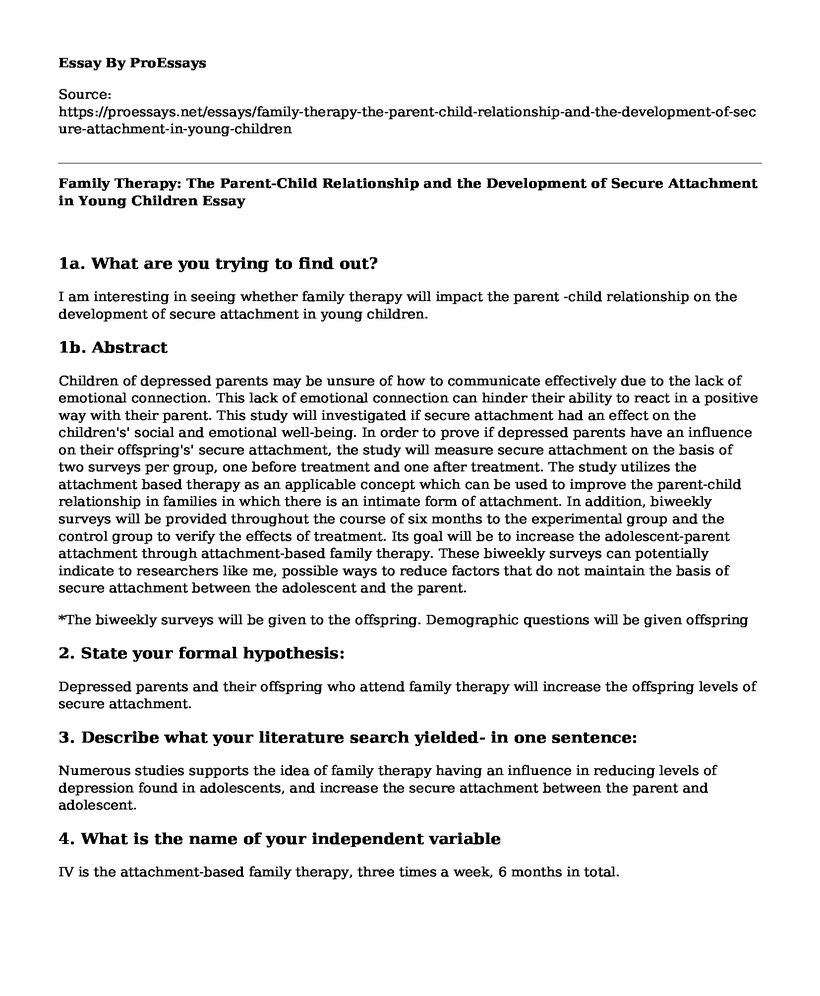1a. What are you trying to find out?
I am interesting in seeing whether family therapy will impact the parent -child relationship on the development of secure attachment in young children.
1b. Abstract
Children of depressed parents may be unsure of how to communicate effectively due to the lack of emotional connection. This lack of emotional connection can hinder their ability to react in a positive way with their parent. This study will investigated if secure attachment had an effect on the children's' social and emotional well-being. In order to prove if depressed parents have an influence on their offspring's' secure attachment, the study will measure secure attachment on the basis of two surveys per group, one before treatment and one after treatment. The study utilizes the attachment based therapy as an applicable concept which can be used to improve the parent-child relationship in families in which there is an intimate form of attachment. In addition, biweekly surveys will be provided throughout the course of six months to the experimental group and the control group to verify the effects of treatment. Its goal will be to increase the adolescent-parent attachment through attachment-based family therapy. These biweekly surveys can potentially indicate to researchers like me, possible ways to reduce factors that do not maintain the basis of secure attachment between the adolescent and the parent.
*The biweekly surveys will be given to the offspring. Demographic questions will be given offspring
2. State your formal hypothesis:
Depressed parents and their offspring who attend family therapy will increase the offspring levels of secure attachment.
3. Describe what your literature search yielded- in one sentence:
Numerous studies supports the idea of family therapy having an influence in reducing levels of depression found in adolescents, and increase the secure attachment between the parent and adolescent.
4. What is the name of your independent variable
IV is the attachment-based family therapy, three times a week, 6 months in total.
5. What is your IV intending to change?
The IV in this experimental is family therapy; it is intended to increase the offspring levels of secure attachment, lower levels of depression in adolescent. The family therapy sessions will build alliance with the parent and the adolescent.
6.Describe your control condition (or quasi-experimental design) - Participants are given a questionnaire survey before the first session, regarding how they view their relationship is with their parents. The participants experiencing psychological disorders/emotional behaviors such as depression, will be given a survey every two weeks for six months to make an observation to conclude any impact of the therapy intervention. The control group will receive the surveys every two weeks, without attachment-based family therapy.
7. What are you going to measure at the end (dependent variables)
The independent variable will measure the levels of secure attachment and levels of depression of the offspring through questionnaires (dependent variables); the initial survey that is given to the experimental and control groups.
8. Survey
The study involves a survey which is accomplished by administering questionnaires to the resource persons for the purpose of data collection on this topic. The questionnaires are intended to yield data on the current condition of the family attachment which may affect the relationship between children and their parents. Because of this, the questions formulated in these instruments were demographic based to understand the situation of the families and determine if the application of the attachment based theory would be of any significant help to the case. The questionnaires were administered to children of age between 12-18 years and contained the following questions:
- What is your age?
- What is your gender?
- What is the age of your mother?
- What is the current age your father?
- For how long do you stay with either of your parents?
- Do you like how you relate with your parents?
- Are you parents willing to spend time with you?
- Are contented with the length of time during which your parents spend with you for a day?
- To what extent are you affected with the extent of your parental attachment?
- Based on your gender does the parental attachment vary from the case of those of different sex?
- Based on your relationship with you parents, do you consider them to love you?
- Do you consider the existence of love from a parent to be any important?
- Which of your parents appear to be more affectionate to you?
- How emotional are you parents?
- How do their emotions affect your relationships with them?
- Are they able to regulate their emotions while handling you?
- How d o you feel attached to your parents?
- Which of your parents appear to be more emotional?
- How do your parents relate among themselves?
- How has your parental attachment changed as you grow?
- Do you think you parents value you?
- Would you like an improvement in your relationship with your parents?
- How would like to relate with your parents?
- How many hours would prefer to spend with any of your parents?
- Do you like sharing your problems with your parents?
Cite this page
Family Therapy: The Parent-Child Relationship and the Development of Secure Attachment in Young Children. (2022, Aug 23). Retrieved from https://proessays.net/essays/family-therapy-the-parent-child-relationship-and-the-development-of-secure-attachment-in-young-children
If you are the original author of this essay and no longer wish to have it published on the ProEssays website, please click below to request its removal:
- Personal Essay Example - An Aspect of College I Found Disappointing
- Critical Incident in Social Work Essay Example
- Research Paper on Effects of Aging and Mitral Valve Prolapse
- Mental Health: A Case Study & Psychological Theories
- Bell Hooks' Call and Response: Racialization and Social Injustice Still Prevalent - Essay Sample
- Applying for Graduate Teaching Program: Literature Education to Middle Children and Adolescents
- Paper Example on Women's Marches: A Historic Day of Feminist Unity







